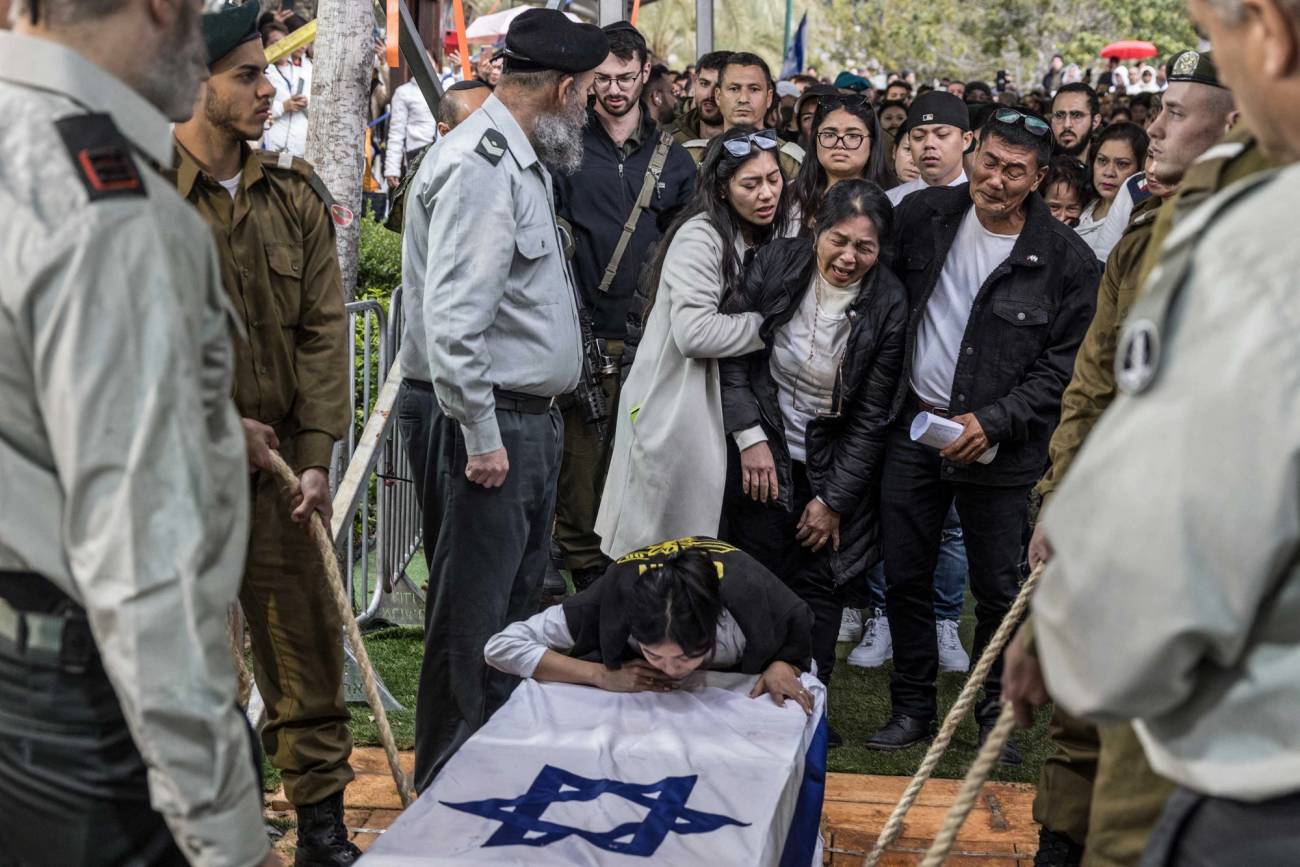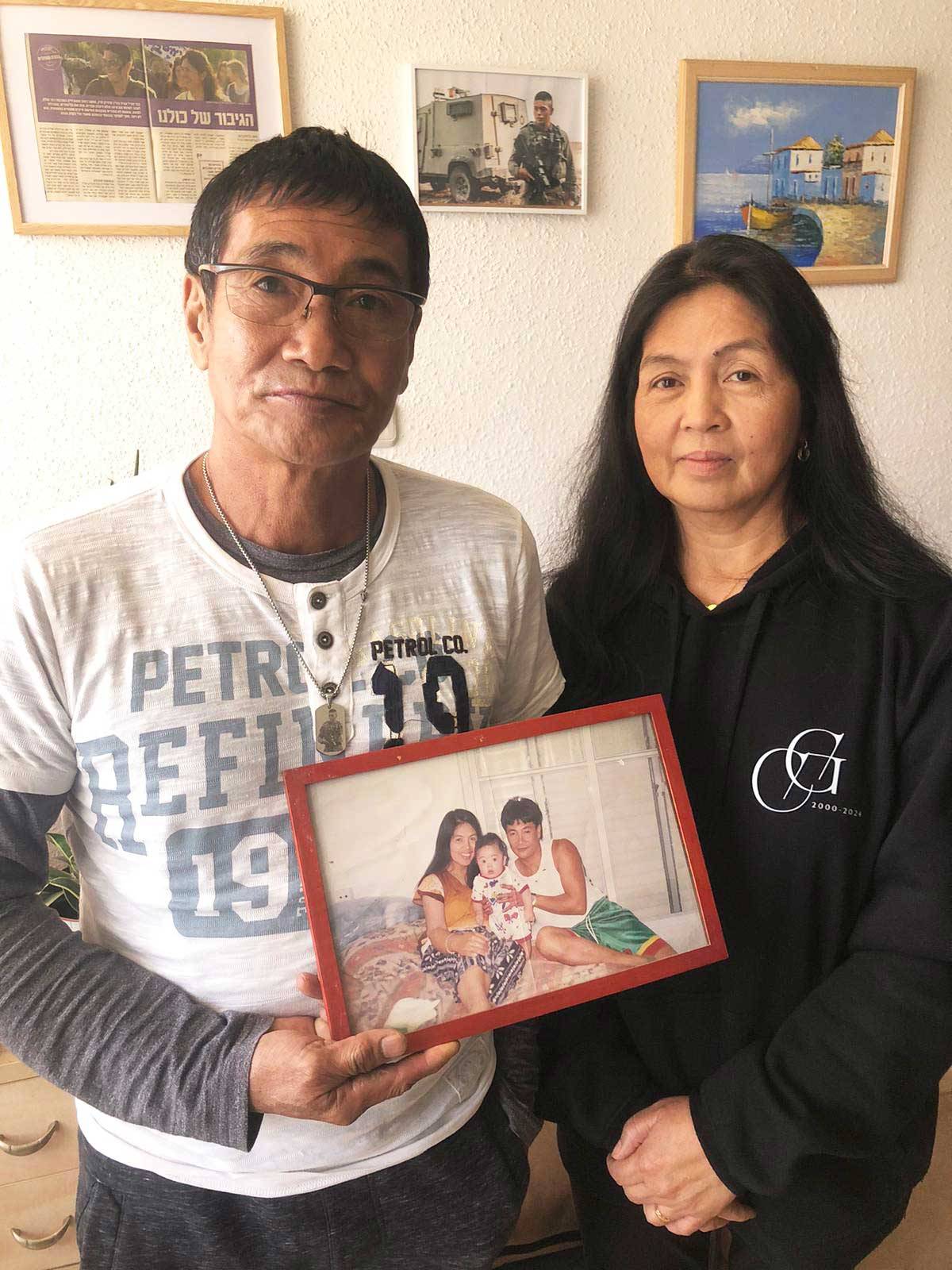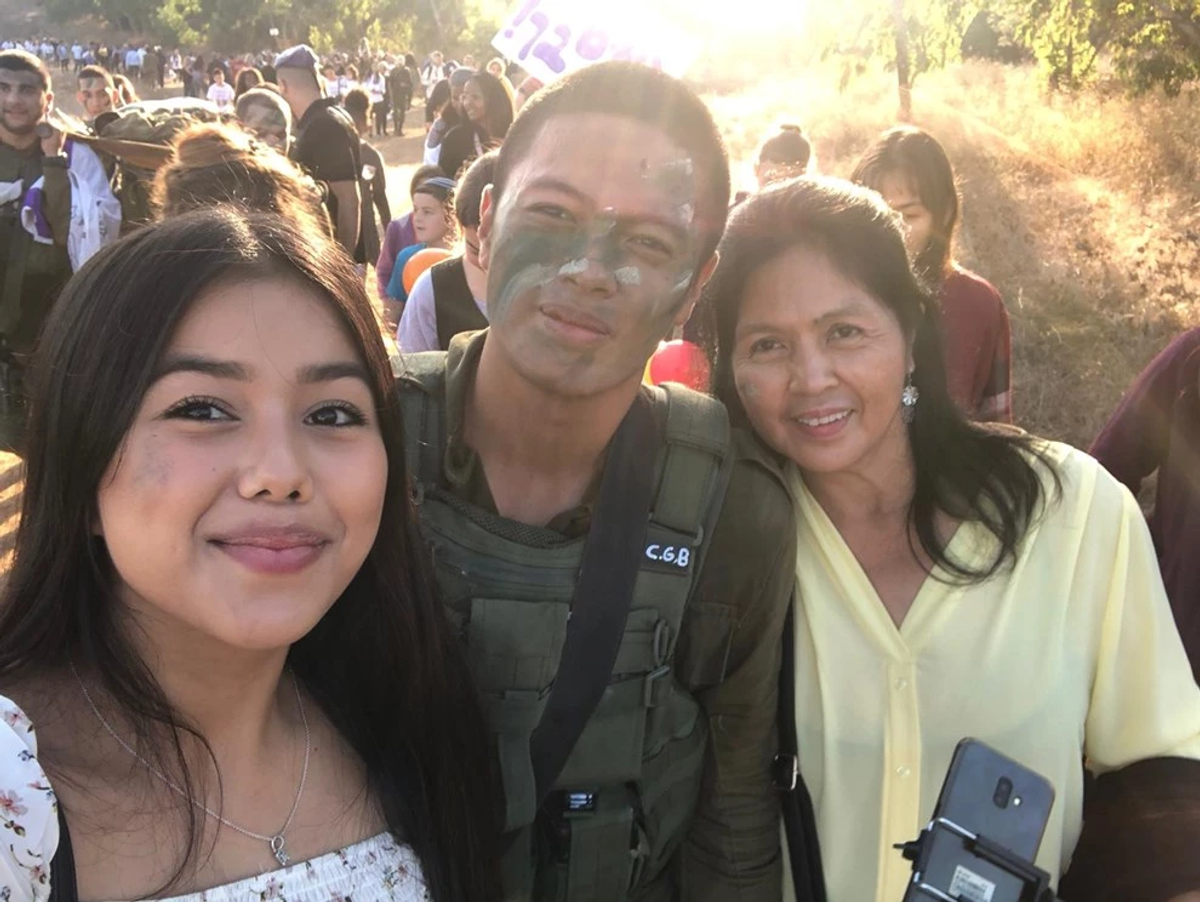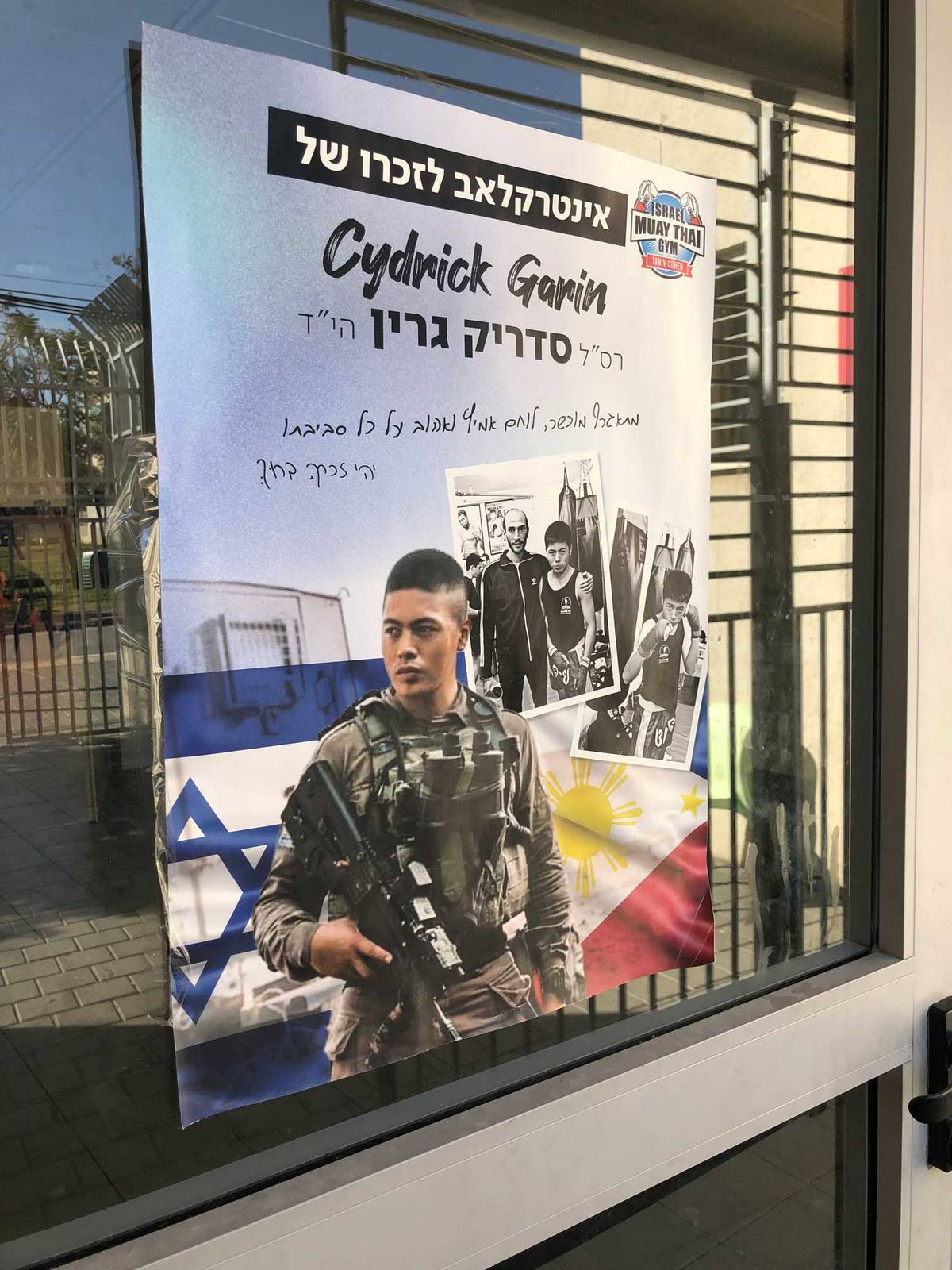Golan Singh drives a motorcycle throughout north Tel Aviv on workdays delivering meals for a restaurant. Every shift, he stops two or three times at the grave of his best friend, Cydrick Garin, at the Kiryat Shaul Cemetery. Singh smokes cigarettes there and talks to Garin, telling him about their friends’ plans for a memorial project tied to Garin’s artistic talent. When he resolves challenges, he says, “Thanks, Cydrick.” He jokes. He cries.
Singh sometimes tells Garin about the Israel Defense Forces’ ongoing war against Hamas in the Gaza Strip. He and Garin became friends attending the Bialik Rogozin School, near the Haganah train station in south Tel Aviv. Haganah means defense. It was the name of Israel’s pre-state military. Singh said he sometimes asks Garin “just to watch over us.”
That’s what Garin, a 23-year-old sergeant major, did until Jan. 22, when he and 20 other IDF soldiers were killed after a Hamas-launched rocket-propelled grenade detonated explosives the soldiers were laying inside a building in Gaza.
Garin had striven to become a combat soldier, refusing to leave an enlistment center where he’d gone with Singh until getting the assignment he craved in the IDF’s Givati brigade. Earlier, at age 13 or 14, he watched a television program about the IDF and told his mother, Imelda, “I want to fight. I love this country and want to protect the people.”
Cydrick’s parents, Enrico and Imelda, hold a 2001 family photo, at their home in Tel AvivCourtesy the author
Israeli boys are wont to begin pondering their IDF service long before reaching draft age. But Garin wasn’t obligated to serve, certainly not in a combat unit. That’s because his official status in Israel was “temporary resident,” not citizen. Garin was born in Tel Aviv, but his father and mother are Christians from the Philippines who came to Israel in 1995 for a better life; they met while working as caregivers for elderly Israelis.
Approximately 30,000 Filipinos work in Israel, most as caregivers, with others employed in hotels, said Teri Bautista, vice consul of the Philippines’ Embassy in Tel Aviv. They live in and near most of Israel’s largest cities, she said.
After completing his service in the IDF—he earned an award for bravery for killing a terrorist during an attack in Hebron—Garin became an Israeli citizen. Imelda was thus entitled to apply for citizenship. It was finalized this year, after her son’s death.
Garin’s father, Enrico Basilio, is now applying for citizenship, too. He was flown in by the Israeli government to attend his son’s funeral and is staying with Imelda. Basilio had been deported from Israel in 2002 because his work visa expired. He saw Imelda and his son only twice since, when they visited the Philippines in 2009 and 2014.
But father and son spoke once or twice each week by phone, usually in mid-afternoon in Israel, nighttime in Mindanao, the Philippines’ second-largest island, where Basilio lives. They always spoke in Hebrew, because Basilio wanted to maintain his command of the language. After Hamas launched its war against Israel on Oct. 7 and Garin was called into reserves, they were lucky to speak once a month.
Their last conversation was on Jan. 8, when Garin was based outside Gaza. He told Basilio that his job was merely to observe fellow soldiers entering and departing Gaza. Basilio was skeptical.
“I told him, ‘Anak’—that means ‘son’—’you don’t really need to fight. You’re not a Jew. You’re not an Israeli,’” Basilio said on a recent Sunday morning sitting across from Imelda in her sun-drenched apartment in south Tel Aviv’s Neve Eliezer neighborhood. “He told me, ‘In my blood I’m Filipino, but in my heart I’m Israeli because I grew up here.’”
The next day, Garin sent his parents a text message. “Pray for us,” it read.
“That’s how we knew he [really] was inside Gaza,” Basilio said.
Basilio never heard from his son again.
“We are proud of him,” said Imelda, “even though we have pain in our hearts.”
Several of Garin’s teachers recall him as quiet, helpful, and respectful to staff and classmates. They and Singh say he was a “mama’s boy,” an only child who admired Imelda and loved her deeply. Imelda said he’d accompany her to the bank and medical appointments because her Hebrew is weak.
Garin’s devotion is what got him in trouble with the law. He was pained by Imelda’s long hours of work and wanted to assist, even though she told him that his studies come first. He got a job at an ice cream shop near the old port of Tel Aviv, working so much that he’d sleep through class. A photograph of Garin snoozing at his desk in high school amused his parents at the shiva, they said.
But Garin’s wish to earn money led him to agree to deliver drugs for a dealer. He once was arrested. He begged the police officer not to handcuff him, sparing him shame in front of his mother. (The officer complied.) After being questioned and spending a night in jail, Garin was released—and stayed straight. His circle is clear about that; Israeli media reports portraying him as an outlaw are inaccurate, they said.
Garin “quickly got himself together because he realized it was a bad path,” said Adam Gilboa, his teacher in 10th and 11th grades. “He was never a criminal. He was a good kid.”
“He was an average student, but adorable,” Gilboa said. “It was hard not to like him. He was someone you wanted to adopt—the whole group, really.”
He meant the students at the Bialik Rogozin School, populated primarily by children of non-Jewish immigrants from Africa, India (the homeland of Singh’s parents), South America, Eastern Europe, and the Philippines. Many of their parents came to Israel to earn more than they could back home. They worked late, some in two jobs, often leaving their kids alone. At a Scouts youth group a few blocks from school, Garin participated in after-school activities and did his homework.
Garin in uniform, pictured with his mother, Imelda (right), and his wife, Daniella (left)IDF
On a recent visit to the Scouts’ Eitan Tribe branch after meeting Garin’s parents, I saw a mix of immigrant children. Across the street from the branch, a poster at the entrance to a youth sports center announces that the Israel Muay Thai Gym was renamed for Garin. “Capable boxer, brave fighter, beloved by all. May his memory be blessed,” reads the text, alongside pictures of Garin as a boy doing Muay Thai boxing (a mix of martial arts) at the gym and of the adult Garin wearing an IDF uniform and armed.
Imelda once asked her son what his favorite subject was. “Sports,” he answered. Garin also “loved to draw; he was creative,” said Nurit Siegel, who taught art at Bialik Rogozin. In ninth grade, Garin’s self-portrait showing words filling his head was selected as a winner in a citywide competition. Siegel accompanied him to the awards ceremony in Jaffa, where the drawing was displayed. “In my mind, he could have done anything,” she said.
When war broke out last October, Garin worked for a restaurant meals-delivery company. But he was still discovering himself professionally. After completing his army service, he worked in security: first for a hospital and then at the Raanana house of then-Prime Minister Naftali Bennett. (Bennett made a shiva visit. His spokeswoman declined a request for an interview for this story.) Imelda said her son wanted to learn crypto-currency trading and real estate. A man who came by during the shiva told Imelda that Garin planned to work at his real estate company to learn the business and then open his own firm. Singh said Garin was studying Arabic, and figured that Garin sought a career in Israel’s security services.
“Cydrick had a lot of dreams, a lot of plans for his mom,” Basilio said.
Garin and his girlfriend, Daniella Ballesteros, were living with Imelda when, in January 2022, the couple traveled to Cyprus. Afterward, Imelda found it curious that mail she took in was addressed to Daniella Garin, but only at an appointment with a government agency in 2023, when Imelda’s computerized record indicated that her son was married, did she realize that the couple had secretly wed in Cyprus. And only last September did Garin and his wife move to an apartment a 10-minute walk away. The move was hard on Imelda.
“He’s my son. He’s my everything,” she said. “If I was sick, he’d take care of me.”
Singh and Garin last met one afternoon in late July last year, at a dog park in their neighborhood. Singh was with his AmStaff, Vaas. Garin brought his white poodle, Couscous.
“I haven’t digested it yet,” Singh said of losing his friend.
Singh shared many stories for this article: about their childhood, their struggles, their girlfriends, their determination to create better lives.
The one I like best was this.
One of their many multiethnic friends at school—a group that included Anderson, from Colombia; Denis, from Kazakhstan; Ibe, from the Ivory Coast; and Alexander, from Eritrea—was Leon, a Brazilian. Leon’s apartment was a veritable zoo.
A memorial poster on the door of Cydrick’s youth sports centerCourtesy the author
Garin was drawn to Leon’s iguana, so much so that he got his own. Garin called his iguana Iggy. He’d put Iggy on his shoulder and rollerblade around the neighborhood. Singh came over one day to find Garin petting Iggy, so Singh did the same. Iggy slashed at him with his tail, cutting Singh’s right hand. But Iggy didn’t seem to hurt Garin, who allowed the iguana to bite his hand, despite having very sharp teeth.
And then, one day, Iggy was gone. He likely crawled out of Garin’s window. Singh went over to help Garin search for him.
“He was sad,” Singh said. “He’d let it bite him, and he’d cared for it and cleaned it.”
I enjoyed imagining Garin rollerblading through south Tel Aviv with Iggy on his shoulder.
A few weeks later, the image of a biting pet recurred, this time one that returned.
Midway through our conversation in Imelda’s apartment, Couscous scampered back in. An hour earlier, as I’d ascended the steps to the fourth floor, Couscous had rushed past me, ignoring Basilio’s calm plea for him to halt. Standing at the apartment door, Basilio said he knew his son’s dog would be back soon enough.
Inside as we talked, Basilio told of visiting his son’s grave with Imelda, Daniella, and two of his son’s friends. It was the day a memorial stone was installed. Couscous smelled around the grave. He stood atop the stone and sniffed some more.
When they returned to the apartment, Couscous wasn’t himself, biting people around him.
“He was mad. … He made trouble at home,” Basilio said. “He knew that my son was in the grave. Now, when we visit my son at the grave, we don’t bring the dog.”



